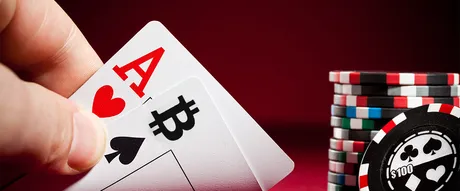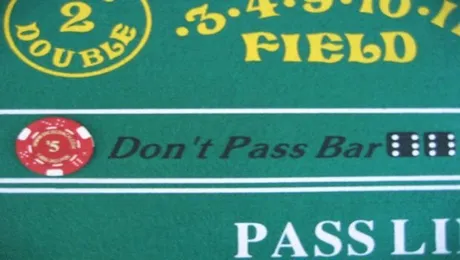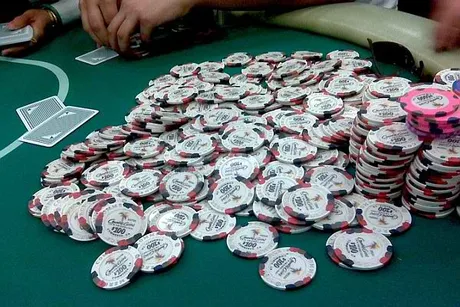
Like many things in this world, the word 'gambling' has a lot of meanings.
The biggest differences come in when we look at how the law is structured. As I've already reported on, "Financial Advice" in the mainstream is completely different than "Financial Advice" as it pertains to the law and getting sued. After some very cursory research into the matter it became quite clear that getting sued for financial advice is quite difficult unless you're being paid to shill the product by an entity who directly benefits from the marketing they're paying for. In essence: it has to be a security to be financial advice. That has some pretty interesting cascading ramifications for the crypto industry that I can't get into here.
What I can say is that "gambling" has similar nuances when it comes to the law.
- Consideration
- Chance
- Prize
If it doesn't have one of these things: it's not gambling.
This is how strategies like corporate "sweepstakes" became so popular.

The "stakes" have been "swept" away.
Rather than having to get a gambling license and be subjected to tedious and copious regulations, a company like Coke will just give away products for free in order to supplement marketing strategy and bolster the brand. How many times have you checked under the cap of a soda to see if you won anything? This is very akin to loss leader strategy in that the company intends to give resources away hoping that the end result is an investment in which they will earn more money later. By eliminating the entry fee (consideration) of the equation, gambling laws are sidestepped. This is why sweepstakes have been so widely utilized over the decades.

What about games of skill?
The second requirement for determining that something is gambling is the chance element. Thus, games of skill can not be gambling. There's actually a surprising amount of debate around this one because a game like Texas Holdem is obviously skill. Professional players consistently win on average and even make their living based on that fact. However, playing a small number of hands (1-100) is very much almost all luck/chance based, while playing 10k-100k hands is all skill. This leads regulators to classify poker as "gambling" even though it is arguably not.
However, there are some activities that most would consider gambling that absolutely are not. That hustler at the pool table tricking people into betting big on the next game? Yeah, pool is a game of skill so that's not gambling. Also, paying an entry fee to a sports tournament (cycling/boxing/whatever) for cash prizes to the winners is also not gambling.
So sports betting isn't gambling?
Of course we already know that indeed sports betting IS gambling. This is where more legalese nuance comes in. If you're betting on yourself to win a game of skill that's not gambling, but if you're betting on someone else as a spectator then that is considered gambling. Apparently this also extends to animals. Horse track anyone?

Prize!
Everyone loves to win a prize. Certainly the prize element of gambling would be the hardest one to remove. What's the point of paying to play a game of chance if there is no prize? Of course there is probably a little bit of legal nuance here in terms of what actually constitutes a "prize".
What is a "prize"?

Ah ha!
See that? The prize has to have some kind of monetary value to be a prize. So if you were say running a charity for the homeless or whatever you could open up a pseudo-casino and run it just like a regular casino. The only catch is that the prizes at the end of the event have to be largely worthless.
Another very important note here is that something like this could be easily done within crypto as well. Like creating a game of chance in which the winners receive soulbound NFTs that can't be traded. Even if the NFTs had utility (like usefulness in a game) it could still be argued that their value is $0 because transferring ownership of the asset directly is not possible.
Of course since when has crypto cared about any of that?
For the most part: we don't. Want to run a dice-game on chain? Run a dice game on chain. Who's going to stop you? Certainly not the chain the game is running on. That is the nature of permissionless systems. Then again such a game is never allowed to scale up and go mainstream due to regulatory scrutiny. Not only does one run the risk of being sued for breach of gambling laws, but also submitting an app to the Play store would be denied instantly without fail.

Do not collect $200.
Of course as crypto and decentralization become more and more mainstream, the ability to regulate these things experiences massive diminishing returns. Users who aren't getting their apps from a centralized agent no longer have to worry about those pesky regulations. The blockchain regulates itself, and outsiders don't get a lot of say in the matter. Certainly I expect to be some friction in this regard, so we'll see how that goes.
The house always wins
Another very important aspect of gambling law is that the regulators are always looking for centralized agents who are "raking" money in from the players who are gambling. That's the standard business model for a casino, makeshift or otherwise. The house must syphon money from the players into their own pocket to generate a profit.
It surprised me to learn that even while poker is considered gambling: home-games are 100% legal in most circumstances. The only case in which poker home-games are not legal is when the person hosting them is raking the pot and just taking money for themselves for free at zero risk just for being the host.
This is actually how the cardrooms I frequented in Portland ended up subverting gambling laws. There was a $10 cover-charge to enter the building and all the dealers were "volunteers" (tips only). Therefore, because they never raked the pots and only charged a fee to get through the door they were able to stay in operation.
Again, this dynamic has huge ramifications for the crypto industry, because open-source decentralized architecture should never have this kind of rake in the first place under any circumstances. Playing games should always be free (like playing chess or checkers online) but it never is when the game in question is a game of money like poker. Why is that? Greed or overreaching regulators?
I actually find it quite shocking that playing poker for free online has never been a thing. That's the entire WEB2 business model: provide free service and monetize the data with ads and whatever else. The crazy thing about poker is that the data in question is extremely valuable because it can be used to dominate the poker tables. Knowing exactly what your opponent does in certain situations is invaluable, yet poker sites have never managed to monetize this data (which is actually quite strange considering ads are also an option).

My ideas for avoiding gambling regulation.
Removing consideration is the easiest way. Long ago I had this idea that we could simply create reputation based systems that trusted the losers to pay up and send the money to the winner. I believe I generically called that model "dumb contracts". This allows anyone to play a game of chance with a prize without having to pay any kind of consideration, making it very sweepstakes-adjacent.
However, should the loser refuse to pay up the network would transparently see that instantly and ban them from the system. If anyone cheats one time they're banned and can only get unbanned by paying what they owe. Of course the most obvious way to attack something like this would be a Sybil attack, which seems to be quite the theme on blockchains. Make a million accounts which all play the game for free once. If the entry fee is $1 maybe such an attack would make a million dollars.
That attack actually wouldn't work for a couple of reasons.
First off: making a million accounts on Hive would be exceedingly difficult. By the time someone was actually able to make that many the cost of minting an account would almost certainly be higher than the entry fee to the game. More importantly: this would be a reputation-based system, so random accounts that just got created with zero reputation aren't even going to be allowed to play the game in the first place.
Other options
The above example is one that doesn't require smart-contracts or any kind of centralized agent to control the system. It could be implemented directly on chain and peer-to-peer without even the need for a server to keep track of everything. However, I had that idea in 2018 and these days Hive is much closer to having smart-contracts that could handle the logic without taking the risk of trusting losers to pay the winners. Trusting the loser to pay the winners is more about creating a system that circumvents gambling laws by eliminating consideration more than anything else.
Hive also has multi-sig now so this would also appear to be an option in which the funds of multiple parties can be pooled into a single account that no one person can control. Multi-sig is also a great shortcut to better decentralize how money moves around on-chain.
What about skill-based games?
Certainly there will also be a lot of opportunities to create skill-based solutions that allow players to bet on their own skill within the game. I have a couple ideas on that front as well but they deserve separate posts. At the end of the day we also have to ask ourselves if we even care what this or that government says about the apps we are running on the chain. That alone is a violation of our sovereignty and they should stay out of it: but of course they won't because imperialism don't care.
Conclusion
The layman's definition of gambling is widely different from the legal definition. Even investing in crypto is not gambling. At worst it's simply "investing" in an unregulated security. Investing is not gambling, at least according to the law.
The definition of gambling is three-pronged (consideration/chance/prize), but also there are many activities that are considered gambling that still fall outside of the law. More often than not, if a centralized agent who rakes money from players does not exist: then gambling laws do not apply. This is yet another example of how the law and decentralization do not really mix in any way. Truly decentralized products exist outside the law entirely. This is by design, as only a centralized agent can be regulated by another centralized agent. Decentralization sidesteps the entire system. This should be obvious considering the establishment's reactions to these developments.
Return from What is Gambling? to edicted's Web3 Blog
